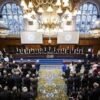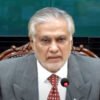WASHINGTON: The Trump administration has put forward a plan to facilitate up to $30 billion in investments aimed at establishing a civilian nuclear energy initiative in Iran. This move involves easing certain sanctions and unlocking billions of dollars in Iranian assets that are currently restricted, according to four sources familiar with the matter.
Despite rising military tensions over the past two weeks involving Iran and Israel, high-level talks have been taking place behind closed doors between U.S. officials, Middle Eastern counterparts, and Iranian representatives. These discussions continued this week following the announcement of a ceasefire agreement in the region.
Sources indicate that multiple initial proposals have been presented, all sharing a core requirement: Iran must agree to halt uranium enrichment activities. A draft proposal reviewed by CNN includes several incentives designed to encourage Iranian cooperation.A confidential meeting held last Friday at the White House, involving U.S. Special Envoy Steve Witkoff and Gulf alliance partners—just a day before U.S. military strikes on Iran—revealed that the proposals involve an estimated $20–30 billion in investment dedicated to a civilian nuclear energy program that does not include uranium enrichment. U.S. officials emphasized that this funding would not come directly from Washington but is expected to be provided by Arab allies. The idea of investing in Iran’s nuclear infrastructure has been part of previous negotiations.
A senior U.S. official told CNN that “the United States is prepared to lead these discussions,” clarifying that while financial support for the program is anticipated, “we will not be the ones providing the funds directly.”Additional incentives discussed include relief from sanctions and access to approximately $6 billion held in foreign bank accounts that are currently inaccessible to Iran. One proposal from last week also suggested that U.S.-backed Gulf states could finance the reconstruction of the Fordow nuclear facility—destroyed by U.S. bombings—and replace it with a non-enrichment nuclear energy project. It remains uncertain whether Iran would retain control over the site or whether the proposal is actively being pursued.
One insider remarked, “Various ideas are being floated as parties seek creative solutions,” while another cautioned, “It remains highly uncertain what the outcome of these efforts will be,” referencing the previous rounds of U.S.–Iran talks.Witkoff told CNBC on Wednesday that the U.S. aims to negotiate a “comprehensive peace agreement,” stressing that all current proposals are focused on preventing Iran from developing nuclear weapons. The U.S. maintains that Iran can operate a civilian nuclear program but should import enriched uranium, similar to the UAE model. Witkoff explained, “The current focus is on how we can rebuild a civil nuclear program that is non-enrichable.”
The Trump administration plans to present a framework agreement to Iran. While President Trump indicated that the U.S. and Iran could meet “next week,” Iranian officials have denied any knowledge of imminent talks, and those involved in planning have said that arrangements are still tentative. No official dates have been set, sources told CNN.
Despite diplomatic efforts, Trump has recently downplayed the urgency of reaching a nuclear deal, stating, “I don’t care if I have an agreement or not,” though his advisers believe a long-term agreement could help cement regional ceasefire efforts.Discussions about terms are ongoing with Iran through regional intermediaries, notably Qatar, which helped broker this week’s ceasefire and will coordinate with the U.S. to prevent renewed hostilities.U.S. officials believe that recent events may have increased Iran’s willingness to accept U.S. conditions. However, some Iranian experts warn that Tehran might accelerate its pursuit of nuclear weapons. Earlier this week, the Iranian parliament approved legislation to suspend cooperation with the UN nuclear watchdog, signaling a move to further obscure its nuclear ambitions.
Prior to Israel’s recent strikes, the U.S. and Iran had engaged in five rounds of negotiations aimed at establishing a new nuclear framework. Washington submitted a proposal to Tehran and anticipated a response during a sixth round in Oman, but these talks were canceled following Israeli military actions.
In the lead-up to U.S. strikes on Iranian nuclear sites last Saturday, the Trump administration communicated through intermediaries that any future military actions would remain limited, reiterating that Iran must refrain from uranium enrichment. At a NATO summit, President Trump hinted at the possibility of an agreement, saying, “We may sign an agreement, I don’t know. I could get a statement that they’re not going nuclear,” emphasizing the importance of non-enrichment commitments.
Secretary of State and National Security Adviser Marco Rubio stated that any formal agreement would require Iran to negotiate directly with the U.S., rather than through intermediaries, emphasizing the importance of direct talks for establishing peaceful relations.Witkoff noted “signs” of progress this week, saying, “We are engaging with multiple Iranian interlocutors. I believe they are prepared to move forward.” However, the ultimate outcome remains uncertain, given the complex geopolitical landscape



